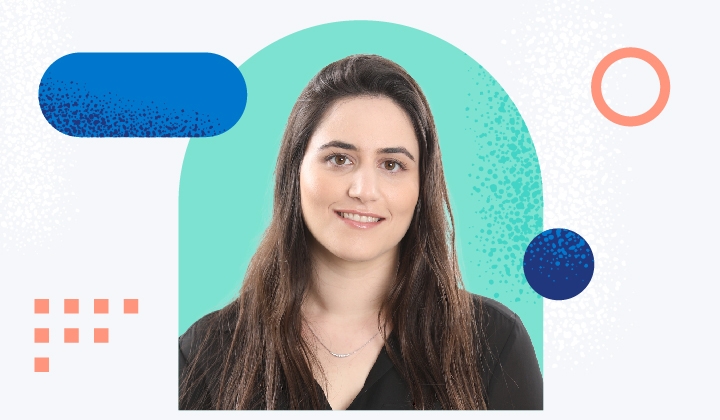How to Create ‘Win-Win Scenarios’ for Your Team — Leadership Advice From a Director

How can you become a successful leader? Just “go for it,” advises Tehila Shneider, Director of Security Engineering at Elastic. “Don't let self-doubt or external challenges deter you from pursuing leadership roles,” she continues. “While there will always be concerns and challenges, remember that growth often happens outside of your comfort zone; everything is solvable.”
Being a great leader also involves recognizing the challenges and goals of your team. When asked about what leadership strategies she’s developed to achieve this, Tehila emphasizes the importance of helping team members align their individual professional goals with organizational objectives to create a ‘win-win scenario’ for everyone. “This scenario can be achieved by getting to know your team through open conversations and learning about their aspirations and career goals,” explains Tehila. “It ensures that every individual not only contributes optimally to the company, but also experiences meaningful growth in their respective careers.”
As such, having open lines of communication with your direct reports and ensuring that they feel supported is key! One way Tehila achieves this is by asking her team about their personal wellbeing during regular one-on-one meetings. “After a certain time, it becomes more natural to share when one needs support, but it takes a while, so I make sure to make it a habit to ask directly in our one-on-one’s,” she elaborates.
And this is only the beginning of her great advice! From Tehila's own career journey to how Elastic supports her growth and wellbeing, read on for career inspiration!
To start, can you tell us a bit about your career journey?
I started my career as a developer in Israel’s intelligence force, and I’ve been leading development teams in various domains ever since. I was the head of engineering at a company called chorus.ai in the sales domain (acquired by ZoomInfo), and led a department of engineering in the mapping services domain. I joined Elastic over two years ago as part of an acquisition of a startup called build.security, in which I was the VP R&D.
What has enabled you to develop and advance your career?
I believe that career development involves a combination of constantly searching for new opportunities and the ability to make a wider impact within the organization.
While changing companies can be a part of this journey, I have found that actively seeking opportunities for growth and taking on responsibilities that allow me to make a meaningful impact have enabled me to advance my career without necessarily changing companies. It's about finding ways to contribute significantly to the current organization and continuously expanding my skill set to stay relevant and competitive in the ever-evolving professional landscape.
Can you tell us more about how your own day-to-day work grew and changed when you first held a leadership position? What about your overall approach to work?
I transitioned into leadership positions way back when I was at the IDF. The most significant change at my day-to-day work was my ability to create a larger impact by leading my team toward our shared objectives. In a leadership role, my focus has shifted from individual tasks to orchestrating collaborative efforts that align with overarching goals. This shift in perspective has not only elevated the scale of my influence, but has also necessitated a more strategic and holistic approach to work.
What do you believe is the No. 1 thing managers must do when onboarding new employees? How did your own manager support you during this process?
The onboarding stage is an overwhelming process. As a manager, I believe that you should provide all possible support for your new employee to help ensure a seamless transition into the organization. This involves having a well-structured onboarding plan in place well before the new employee's arrival.
In my own experience, the most supportive managers have been those who took the time to check in regularly during the initial weeks, making themselves approachable for any questions or concerns. Creating an environment where new employees feel supported and valued is crucial for their long-term success within the organization.
Moving on, let’s talk about how Elastic supports growth on an organization-wide level. Does Elastic have programs in place for mentor or sponsorship?
Elastic offers both formal and informal mentorship programs. The company has established structured processes to facilitate partnerships between advisors and advisees, aligning with the specific areas of growth and interest for individuals. In my role, I actively participate in connecting individuals within these mentorship programs, contributing to the cultivation of a supportive and collaborative environment. This dual approach, combining formalized structures with organic connections, enriches the mentorship experience and underscores the company's commitment to fostering professional development and growth among employees.
Finally, what is your favorite perk about working at Elastic?
My favorite part about working at Elastic is the work-from-home philosophy. This approach has not only allowed me to become more efficient in my work, but has also added a much-needed flexibility between my professional and personal life. In addition, working remotely has improved my communication skills, particularly in written form, making me a more effective communicator overall.
In addition, working at Elastic has the benefit of being part of an open source company, which fosters a collaborative and innovative environment. This allows us to frequently engage with the community, enhance the quality of our work and encourages continuous learning.
Fairygodboss is proud to partner with Elastic. Find a job there today!
This blog post was originally published on the Fairygodboss website.